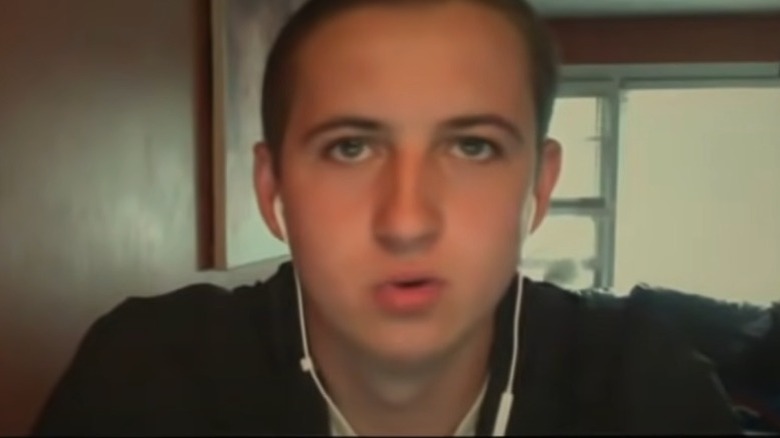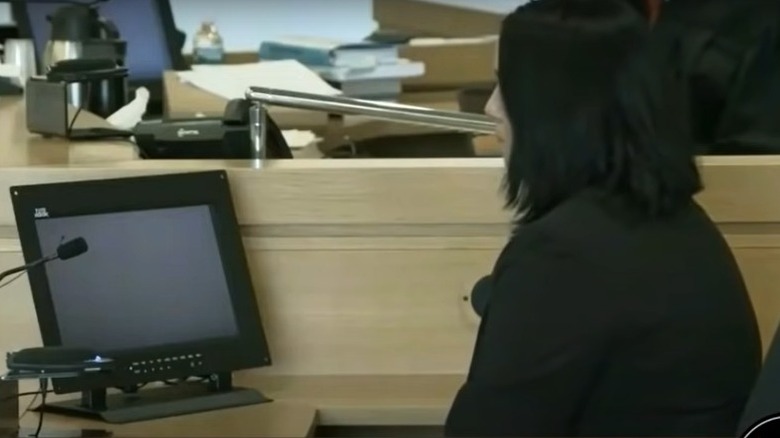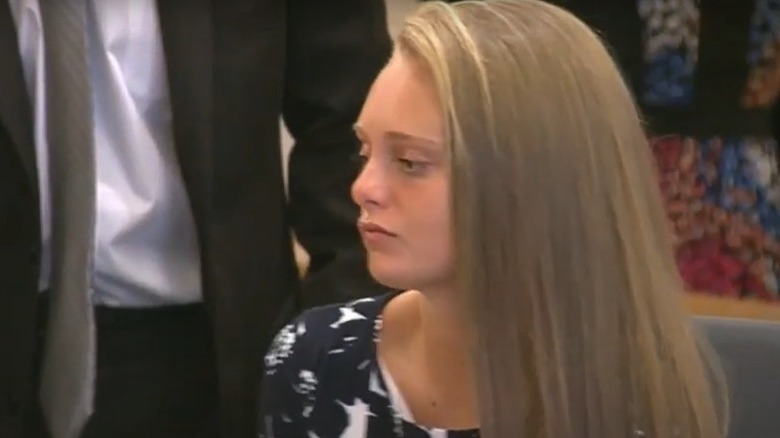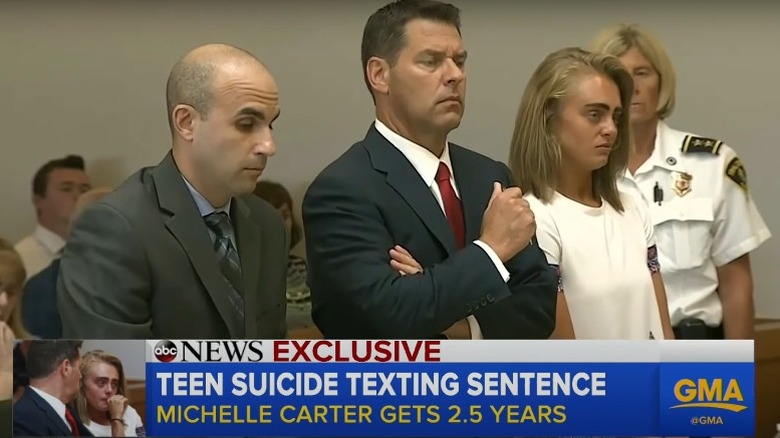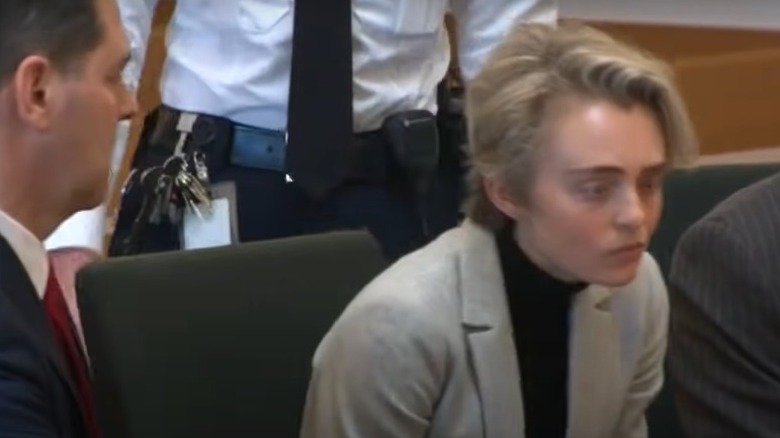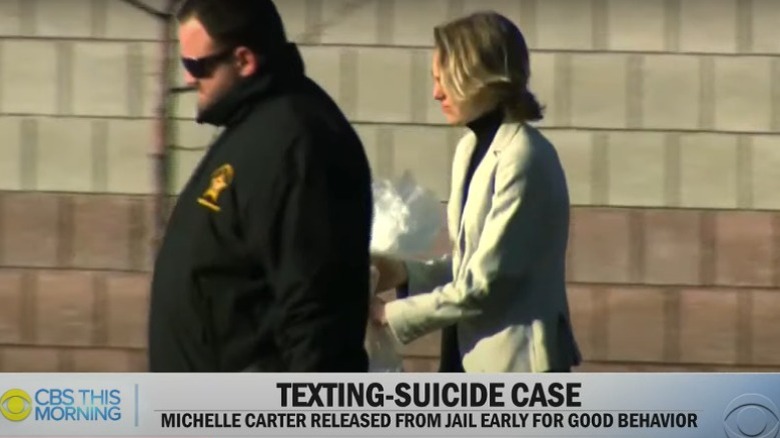The Horrific True Story Behind The Girl From Plainville
According to the American Foundation for Suicide Prevention, there were over 45,000 deaths by suicide in 2020, while an estimated 1.2 million Americans attempted to end, perhaps showing that medical assistance and intervention by loved ones help to save lives. But what happens when a person with suicidal thoughts is not only persuaded to end their life but is also encouraged to follow through with it even after they expressed sincere doubts about completing suicide?
That is what occurred one Sunday evening in July 2014 when Conrad Roy III ended his life. Before he died by suicide, he had been exchanging text messages with his girlfriend, Michelle Carter. The topic of discussion was Roy's bid to kill himself, with Carter acting not only as an accomplice but also what was perceived later as an instigator.
The text messages between Conrad Roy and Michelle Carter provided the evidence prosecutors needed in bringing charges against her the following year. In February of 2015, The Sun reported that the Plainfield, Massachusetts woman was charged with involuntary manslaughter. But Michelle Carter had her own issues, and the case was more complicated than it first appeared. This is the horrific true story behind Hulu's "The Girl from Plainville."
This article contains many references to suicide. If you or anyone you know is having suicidal thoughts, please call the National Suicide Prevention Lifeline at 1-800-273-TALK (8255).
Conrad Roy had a long history of mental health issues
Conrad Roy's struggle with his mental health wasn't unfamiliar territory for the teenage couple. Mass Live reported that Roy had attempted to take his life in 2012 by overdosing on acetaminophen. This unsuccessful attempt occurred just after Roy had been released from a treatment program.
Despite her son's history of mental health struggles, his mother Lynn didn't believe that anything was amiss with Roy, up to the day that he passed. "I thought he was a little depressed. I thought he was doing great," she testified in court during Michelle Carter's trial. She went on to describe how she and her son spent time walking on the beach the day of Roy's suicide. She recounted how Roy was joking about his future and was discussing his plans for a career. What she didn't know was that during this time, Roy was actively texting with Carter, planning out the logistics of his suicide for later that day.
Playing in court were videos that Roy made of himself that were retrieved from his computer (pictured). The New York Times stated that Roy's own words in one video described himself as a "minuscule little particle on the face of this earth." In another video segment, Roy referred to himself as "an abortion," and claimed that his life was a joke. Despite this, court evidence showed that Conrad Roy became frightened during the suicide attempt and tried to back out. But Michelle Carter changed his mind.
Conrad Roy had a promising future
Despite Conrad Roy's struggles with his mental health, he was an excellent student with an enviable level of athletic prowess. The Cut discusses how Roy graduated from high school a month before his death, posting an impressive 3.88 GPA. Though he later declined to attend, he had also been accepted into Fitchburg State University. While in high school, Roy played baseball and was on his school's rowing team. The grandson of a successful tugboat company owner in Massachusetts, Roy had hinted that he was going to follow in those footsteps. The year that Roy died, he completed his training and successfully obtained his captain's license.
On the surface, Roy had a bright future lay ahead of him. But with his anxiety and depression seeming to worsen, Roy had been pushed to the edge. Unfortunately for Roy and his family, the person he confided his plans for suicide to was Michelle Carter. At one point, Roy sent a text to Carter suggesting that they become Romeo and Juliet, with Roy asking Carter (per Mass Live) "You know what happens in the end, right?" To which Carter responded, "Oh, no. We're not dying."
Michelle Carter had been encouraging Conrad Roy to get professional help for some time. Maybe it was because she was trying to help Roy, or perhaps it was because she was all too familiar with mental health struggles.
Michelle Carter struggled with her own mental health issues
Michelle Carter had a long history of mental health problems. She had recently begun taking the medication Celexa (via People), used to treat anxiety and depression. In interviews with The Cut, Carter's former classmates outline a portrait of a person that was quite similar to Conrad Roy's in many ways. Carter was popular among her peers and was also athletic. Carter was at one time voted "class clown," and "most likely to brighten your day."
But her peers also spoke of Carter's fluctuating weight, and how Carter had at one time referred to being admitted to McClean Hospital for mental health treatment. Yahoo News references the 2019 HBO documentary "I Love You, Now Die," a 2-part series about the Roy suicide case. According to this source, Carter had been on psychiatric medication since the age of 14. She had also struggled with eating disorders.
With two young lovers suffering from so many unresolved issues, it might make one wonder how Conrad Roy and Michelle Carter became acquainted in the first place.
Conrad Roy and Michelle Carter only met in person a few times
While both Michelle Carter and Conrad Roy lived in Massachusetts, it was their families vacationing in Florida that led to the two of them meeting. According to Esquire, Carter was in Naples visiting with her grandparents in February 2012. Several doors down from where Carter was staying, Roy was being hosted by his great-aunt. Carter and Roy met and began spending time together in Florida. Long bike rides and walks ensued. Carter was one year Roy's junior, and the two of them stayed in close contact after they left Florida to return to their respective homes in Massachusetts.
The relationship between Roy and Carter was mostly one that was held within the confines of digital communications. Though Roy and his family only lived about an hour from Carter's Plainville home, they may as well have been worlds apart. According to Newsweek, the relationship they had was mostly via text messages and phone calls. Esquire wrote that, according to Lynn Roy, her son and Michelle Carter had seen each other in person no more than five times after their initial meeting in Naples before his death in July 2014.
Michelle Carter felt it was her duty to help Conrad Roy die
When Conrad Roy's mother Lynn was testifying at Michelle Carter's trial (pictured), she was questioned about Roy's suicide attempt in 2012 when he swallowed an entire bottle of Tylenol. Esquire reported that she said Roy's plot was foiled when he phoned a friend immediately afterward. This phone call saved Roy's life. But there would be no friendly hand to stave off death for Roy in July 2014. Instead, he was being encouraged to complete what he started by Carter.
Though she had tried in vain to get Roy to seek professional help in the months leading up to his eventual suicide, Carter had a change of heart in the weeks before his death. When Roy had mentioned suicide in the past, Carter demanded that he get treatment. Why that tone changed is up for debate. What is known, is that Roy and Carter exchanged hundreds of text messages the day of his death, with Carter continually pushing Roy into following through with the job.
When investigators seized Carter's computer and cell phone months later, they discovered the barrage of messages exchanged between her and Roy in the hours before his death. When these messages were presented in court, they served as damning evidence in Michelle Carter's eventual conviction.
The texts Michelle Carter sent Conrad Roy are chilling to read
Boston 25 News released the text messages between Michelle Carter and Conrad Roy from the day of Roy's suicide, July 13, 2014. Early that morning, Carter sent a message to Roy asking why he hadn't "done it" yet. After Roy replied that he was "too messed up (in his head) to," Carter berated him for pushing it off. Throughout the day, Roy received messages from Carter that contained disturbing content.
In her messages to Roy, Carter seemed to be pressing Roy to end his life. She accused him of overthinking everything and kept assuring him that his suffering would be over when he followed through. At several points throughout the day, Carter appeared to be frustrated with Roy's hesitancy. She kept trying to impress on him that the only way to be free was to end his life. And when he kept making excuses for why he hadn't followed through, Carter responded with "I thought you wanted to do this."
Early that same evening, Roy pulled his pickup truck into a K-Mart parking lot. Cell phone records show that he and Carter had two lengthy phone calls after the text messages, but there is no known audio record of the calls. What we do know is that Michelle Carter revealed details of those phone calls to a friend after Roy's death.
At one point, Carter ordered Roy to continue after he had second thoughts
The messages between Conrad Roy and Michelle Carter stopped at 6:28 pm the night of Roy's death (via Boston 25 News). This left investigators with part of a picture painted by the message exchange between the two and would later have it filled in more by statements from Carter's friend Samantha Boardman. Esquire reports that following the last text at 6:28, Roy called Carter in a call that lasted just over 42 minutes. At 7:12 pm, Carter called Roy, their phones connecting for over 45 minutes. Two days later, texts between Carter and Boardman reveal a message from Carter in which she claimed responsibility for his suicide and that she could have done something to stop him but failed to act.
According to Newsweek, Carter continued to lay the foundation of her guilt by texting that Roy's death was all her fault. In this series of texts, Carter admitted that she could have stopped it while they were on the phone together. She revealed that at one point, Roy became afraid and exited his truck as it was filling with fumes. According to Carter, she verbally ordered Roy to get back inside his truck and finish what he started.
Several months after Roy's death, Michelle Carter was approached by a police detective (via Esquire), who said he had a warrant to seize Carter's phone.
If you or anyone you know is having suicidal thoughts, please call the National Suicide Prevention Lifeline at 1-800-273-TALK (8255).
Michelle Carter was charged as a 'youthful offender'
The 317 pages of texts between Michelle Carter and Conrad Roy that were laid out in court chronicled the entire timeline of the conversations the two teens had regarding Roy's eventual suicide. Brought into court on a charge of involuntary manslaughter, Carter faced up to 20 years in prison. Though only 17 at the time of Roy's death, Carter was charged as a "youthful offender" instead of as a juvenile. According to Rolling Stone, this would allow for the state to seek a stiffer sentence.
Carter entered a plea of "not guilty," at the indictment. After being charged, Carter was held on a $250,000 bond. This was posted by her parents, and she was released into their custody. Michelle Carter was prohibited from any access to social media. The Boston Globe reported that she was also barred from sending text messages to anyone outside of immediate family members.
The defense tried to claim Michelle Carter had First Amendment rights
Michelle Carter's defense team argued that she had First Amendment protection against her involuntary manslaughter charge. Attorney Joseph Cataldo pointed out that the state of Massachusetts (per Mass Live) doesn't have any specific laws against assisting someone in their suicide. Cataldo referenced a recent ruling by the Minnesota Supreme Court in which they ruled that encouraging suicide was protected speech.
But prosecutors insisted that the encouragement for following through with the suicide is exactly what prompted Conrad Roy to finish the job. While she could have phoned the police or requested medical treatment for Roy, she did nothing. This, according to prosecutors, made her culpable in Roy's death.
In the end, Carter's defense team was unsuccessful in getting her charges dismissed and was equally unsuccessful in securing a not guilty verdict. In June 2017, Carter was found guilty in the juvenile court in which she was tried (per CNN) and awaited her sentencing hearing set for August of that year. Carter was sentenced to 2.5 years in prison, with 15 months to be served and the remainder 15 months to be suspended. In addition, Carter was to be on probation for five years following her release. Though she was sentenced in August of 2017, it would be several years before Michelle Carter saw the inside of a prison cell.
After her guilty verdict, Michelle Carter remained a free woman for years
In cases where a convicted person is no longer deemed an immediate threat or a flight risk, a judge may allow that person to remain free on bond post-conviction until the case is reversed or upheld on appeal. When Michelle Carter's attorneys asked for this consideration, Judge Lawrence Moniz granted their request. With the post-conviction appeal process mired in red tape, it took until February 2019 before the high court in the state of Massachusetts made their ruling. According to CNN, the Massachusetts Supreme Court voted to uphold the lower court's conviction. This prompted Moniz to have Carter surrender herself to Bristol County authorities immediately to begin her 15-month prison sentence.
Her attorneys unsuccessfully tried to get an additional stay of her sentence while appealing to the United States Supreme Court. This additional stay was denied by Moniz.
But for nearly five years after Conrad's death, Michelle Carter remained a free woman. And records show that she didn't stay behind bars nearly as long as she could have.
Michelle Carter only served 11 months behind bars
According to ABC News, Michelle Carter was sentenced on August 3, 2017 to 2.5 years in prison after being found guilty of involuntary manslaughter. Judge Lawrence Moniz ordered Carter to serve her time at the Bristol County House of Corrections but ruled that she only need to serve a total of 15 months maximum behind prison walls. Moniz suspended the remainder of the sentence and ordered five years probation for Carter after she is released.
People reports that law in Massachusetts will allow a convicted person to have up to 10 days taken off their sentence every month for good behavior. Jonathan Darling, a spokesperson for the Bristol County House of Corrections, told the outlet that Carter "was considered a model inmate at the Bristol County House of Corrections. She took part in a lot of programs, was polite with the staff, had no problems with other inmates."
With good behavior, this ended up reducing Michelle Carter's total time behind bars to a mere 11 months. News of her early release did not sit well with members of the Roy family. The New York Post was told by Conrad Roy's grandfather, Conrad Roy Sr., that he was "disgusted with the whole system." The elder Roy continued expressing his frustration, adding that "the sentence was too lenient; 15 months is nothing to a lifetime with my grandson."

